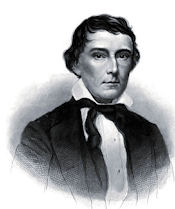Mr. President: I have been notified by a committee of this body of my election to the office of Vice-President under the Provisional Government established for the Confederate States of America; the notification is in a letter, which I beg leave to read:
Montgomery, Ala., February 9, 1861.
Sir: The Congress of the Provisional Government for the Confederate States of America have this day unanimously elected you to the office of Vice-President of the Confederate States, and we have been appointed to communicate the fact, and to respectfully invite your acceptance.
In performing this pleasing duty, allow us to express the hope that you will accept; and we beg to suggest that it would be most agreeable to the body we represent, as you are a member of the Congress, that you should signify to it, in person, your consent to serve the country in the high position to which you have been called.
We have the honor to be, very respectfully, yours,
JOHN PERKINS, Jr.,
W. P. HARRIS,
JNO. GILL SHORTER.
To Hon. Alexander H. Stephens.
From this it appears to be the general desire that I should in person make known to the body in a verbal response my acceptance of the high position to which I have been called.
This I now do. In this august presence, before you, Mr. President, before this Congress and before this large concourse of people under the bright sun and brilliant skies which now smile so auspiciously upon us, I will take this occasion also to return my most profound acknowledgments for this expression of confidence on the part of Congress.
There are special reasons why I place an unusually high estimate on it. The considerations that induced me to accept it I need not state. Suffice it to say that it may be deemed questionable whether any good citizen can refuse to discharge any duty that may be assigned him by his country in an hour of need.
It might be expected that I should at this time indulge in some remarks upon the state of our public affairs, the dangers that threaten us, and the most advisable measures to he adopted to meet pressing exigencies. Allow me to say, that in the absence of the distinguished gentleman who has been called to the chief executive chair I think it best to forbear to say anything on such matters. We expect him here in a few days—by Wednesday of this week at farthest—unless providentially detained longer. When he comes we will hear from him on all these difficult questions, and I doubt not we shall cordially and harmoniously concur in the line of policy his superior wisdom and statesmanship shall indicate. In the meantime there are matters we may very profitably be directing our attention to. Such as providing necessary postal arrangements, making provision for the transfer of the custom-houses from the jurisdiction of the separate States to the Confederacy, and the imposition of such duties as will be necessary to meet present and expected exigencies. In the exercise of the power to assess duties we are limited to the objects of revenue. A small duty, not exceeding 10 per cent upon importations, it is believed will be sufficient.
And above all, in the interim between this and the arrival and inauguration of the President, we can be directing our attention to the constitution of a permanent government, stable and durable, which is one of the leading objects of our assembling.
I am now ready to take the oath of office.
______
Source: Journal of the Congress of the Confederate States of America, 1861 – 1865. Vol. 1; page 42



